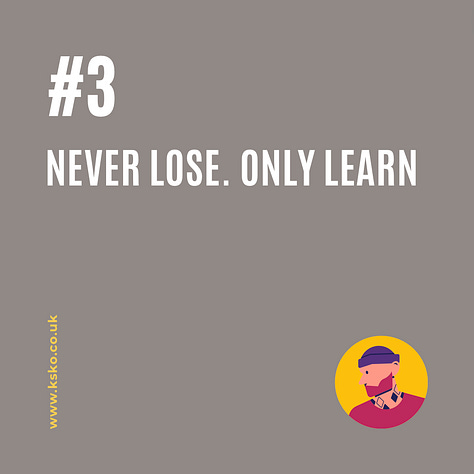Grappling with the Grief of Redundancy: 3 Rules for Recovery
Knowing Self-Aware Leadership
Hello KSKOers
I’ve been thinking a lot about redundancy lately. I’ve walked along the path with my colleagues over the last few months and now I too am heading for another instance where one door closes and another opens. So, I thought I’d share with you my reflections and reminiscences of my first redundancy in 2019 and what I learned from it.
If you’re going through it right now, I wish you care, kindness, strength and calm. You will get through it, and you’ll come out stronger on the other side, I have no doubt.
This article is usually for paid subscribers, but I thought this one would benefit more people if it was free.
Looking forward to joining you on your learning journey!
In 2019 my role was made redundant. The notice came out the first week in January.
From 2017 to 2019. I’d lead a restructure of my team and was very wise to the fact that the next time around, it could be me. I knew that rather than leading a restructure I might be the one being restructured next time. I had this little mantra in my head…
“If they’ll do it with you, they’ll do it to you.”
So, I always carried Plan B in my back pocket
I’d worked in the organisation for nearly eight years and I absolutely loved every minute of my job. I’d decided, maybe six months before, that I would start looking for another job, whilst I still loved the one I was in. I knew that I didn’t want to hang around long enough to find myself hating my job. I’d been there before and remembered the sense of desperation at not being able to find a way out. I didn’t want to be in that position again - like a cat scrabbling up the walls of a slippery well. I wanted to leave when I had time to be choosy and reflect on my next career move before jumping. But, during my choosy-era, the notice came that voluntary redundancy was on offer.
After six months of passively looking, I realised that the opportunities for me were limited. The roles I was interested in were few and far between. The public sector’s financial situation meant that people were remaining in their roles to see out their ticket. For roles that were vacated, organisations were deleting them from the structure as soon as the incumbent’s heel hit the pavement. Financial efficiency was the strategic imperative and role deletion was the solution.
The only option was to go where the opportunities were.
It was an incredibly exciting time and I was gleefully delighted to be offered a nice little redundancy package after 19 years of work. I started actively looking for jobs and discovered that the Avalon of opportunities was in the Old Smoke: London. I packed up my husband, my house and my dog and we moved 175 miles east to explore what the City had to offer.
Unexpected opportunities presented themselves and I was drawn back to the National Health Service - in England this time, instead of Wales - which is a very different machine.

About 18 months later, after the excitement of the move, and the new job and the new City became the norm, the realisation of redundancy hit me. I can’t remember what situation prompted it or who I was with or what triggered the thought. But, I felt an overwhelming sense of anger that my previous organisation had put me in the position of having to choose, and a sense of grief that they were happy to let me. It was a momentary and fleeting sense, but one that’s crept up on me from time to time since then.
I felt no particular ill-will towards my managers, as individuals and human beings. After all, I’d been in exactly the same position as they were two years before and I’d made many people redundant too. I reflected on my own thoughts from that time. People fell into three groups:
1) ‘the go-getters who’d be just fine’
2) ‘the lifers who’d stay whatever’, and
3) ‘the ones that had to go!’.
I don’t know which group I fell into, when my senior colleagues were making the decision to merge my role with another and create one instead. I never asked. At the time I was too excited by the opportunities ahead to be sad about what I was leaving behind.
Well, redundancy is a bitter pill. There’s grief for the comfort of the familiar and the warmth of a job well done. There’s hurt at being rejected by an organisation that felt like home. And there’s elation at the excitement of a future yet unplanned. But above all, there’s great learning. You might have heard me quote before, from the erudite Nelson Mandela….
“I never lose. I win or I learn.”
And in this case, he’s absolutely right. I worked in a job I loved, for the longest period I’ve ever worked anywhere. I had colleagues that were fiercely kind and generously caring. As a professional, I grew up there: my leadership and management skills were nurtured there. I learned the benefit of having Plan B in my back pocket. And I had a chance to push beyond my comfort zone and become so much more than the 30 year old me ever thought possible.
Here are my three rules for recovering from the grief of redundancy….



Always have Plan B in your back pocket: Never be surprised. You might be shocked but never be surprised! Have Plan B in your back pocket, always. Know what’s within your locus of control and be the master of your own future plan. Know what your parameters are, know what your responsibilities are and the financial envelope you need to meet them. Don’t float along on someone else’s current. Stay because you choose to. Go because you choose to.
What would you do in their position?: Restructures and re-organisations are never easy. If you focus on the person, the individual, their family and their bills, you’d be bankrupt within a year. Think about the needs of the organisations and the functions of the role. They start there. You should start there too. What would you do to keep the business afloat? How would you make services slicker? How could you cut costs? What would you do if you were in there position?
Never lose. Only Learn: Let yourself feel sad. Let yourself feel angry. But don’t let it consume you. Let it be a momentary memory that pricks you from time to time but don’t let it drag you to the depths of despair. Shift your mindset and embrace the growth. Share your learning about the awful process with the next person that has to go through it. Share so that it can be improved. Impart your knowledge, ask poignant questions on their behalf, and walk alongside them. Let them lean on you and learn from you.
The Last Word
Redundancy will never be a barrel of laughs. Whether you’re excited by change or alarmed, a change is always a gamble. When you’re working alongside other people, you will feel their worries. You will be anxious for a positive outcome both for them and for yourself. Once the upheaval is over, there will be a period of adjustment. There will be opportunities for reflection and scrutiny with hindsight. But you are not your redundancy. It’s just a chapter in your story.
Nia is an expert leader who talks the talk and walks the walk. She is an academically awarded thought leader in self-aware leadership and practices self-aware leadership every single day in her role as a Director in a Children’s Charity.
Find out more about Self-Aware Leadership by getting your very own copy of The Self-Awareness Superhighway! It’s an Amazon Best Seller in.....
🥇Business Management & Leadership
🥇Occupational & Organisational Psychology
🥇Business Careers












